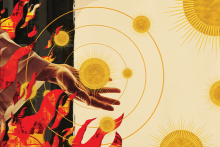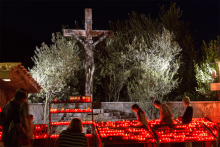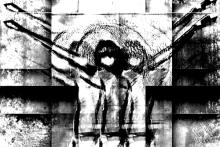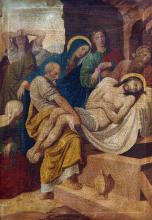Good Friday

At some point this Easter Weekend, Christians will be reflecting on the final words that Jesus spoke from the cross, sometimes referred to as the seven last words of Jesus.
When I was younger, I was convinced that System of a Down’s “Chop Suey!” was a Christian song because lead vocalist and lyricist Serj Tankian incorporated Jesus’ final declarations into the song. But dissimilar to the order that Christians have typically arranged Jesus’ final words, the song first quotes the cry of reunion and then climaxes with the cry of dereliction.
Considering that the Roman Empire believed Jesus was a terrorist and crucified him as one, emphasizing the cry of dereliction seems apt.

A CENTURY AGO, the baseball-player-turned-evangelical-revivalist Billy Sunday preached a gospel supercharged by conspiracy theory and nationalism. He spoke against the backdrop of World War I to masses seized by national security anxiety directed at immigrant communities. Deploying a message made urgent and relevant by its conspiratorial frame, Sunday preached, “They call us the ‘melting pot.’ Then it’s up to us to skim off the slag that won’t melt into Americanism and throw it into hell or somewhere else.”
Hellish rhetoric has a long history in the United States for animating theological paranoia in service of supremacist political power. It’s also been part and parcel of American evangelicalism.
Like many kids growing up in evangelical culture in the 1990s, I was extremely familiar with hell. Popular preaching led with hell before it ever spoke of heaven. It described a place of terror reserved for the unbelieving, who always happened to be from the wrong political party or country. In those days, evangelical churches hosted so-called hell houses to “scare straight” teenagers who strayed from a very narrow moral code. My own church did annual dramas depicting people in hell. I prayed the “Sinner’s Prayer” more times than I could count, hoping I really meant it enough to save me for good. If you were to ask me then: “Do you believe in hell?” I would have said “Of course! I’m a Christian!” Belief in hell went hand in hand with belief in Jesus.
My faith today requires me to dismantle the understanding of hell I received as a child and the cultural use of hell popular today in the rise of Christian nationalism. Hell, in the Trump era, is a rogue theological element, unmoored from the Christian story. When Donald Trump says, “I want to make the country great again. This country is a hellhole,” he casts himself, theologically, in the role of Christ, dispensing judgment on who is good and who is bad.
Trump wields diabolical power to throw people to political hells — and that’s what he’s doing. This isn’t new. Poet Langston Hughes wrote prophetically in 1936, “Fascism is a new name for that kind of terror the Negro has always faced in America.”
In this stream of prophetic thought, we are roused to consider our own responsibility today. We cannot look away from the political hells rising up around us, including indiscriminate ICE raids at churches; repurposing the Guantanamo Bay detention camp to hold migrants; freezing funding for critical family services and health programs in the U.S. and around the world; dispossessing hundreds of thousands of civil servants from their livelihood; and blocking asylum access for those in fear for their lives — all creating indescribable suffering for those who don’t fit a very narrow white supremacist or libertarian agenda.

Three years prior to Jesus’ crucifixion, he had launched a public movement in the violent society of the Roman Empire. He said that God’s kingdom was coming close, and he invited people to rethink their lives in light of it. His message revolved around a teaching that we desperately need to embrace today. That teaching, however, is also what led to his crucifixion.

During the medieval Good Friday service, Christians prayed for the “perfidious” — or deceitful — Jews that God might “remove the veil from their hearts so that they would know Jesus Christ.” In another part of the service, a crucifix was placed in front of the congregation so people could venerate the crucified body of Jesus.

Many of the white evangelical churches I have visited and grew up in framed Good Friday as a celebration. I have attended services that centered around dramatic skits or clips of Mel Gibson’s The Passion of the Christ in order to evoke an emotional response. Another service treated Good Friday like a visitation where congregants were encouraged to reflect on their “friend Jesus” and share words of gratitude.

The Vatican’s decision to have both Ukrainians and Russians take part in Pope Francis’ “Way of the Cross” procession on Friday has caused friction with Ukrainian Catholic leaders, who want it to be reconsidered.

Today begins the Paschal Triduum, the three days leading up to the celebration of Easter and Jesus’ triumphant resurrection. This year in particular, Holy Week is a reminder that we often have to linger in some suffering and struggle in order to fully appreciate the joy of Easter Sunday’s deliverance and liberation.

The growing uncertainty of the COVID-19 pandemic has left many feeling frustrated, losing hope and faith in God, life, family, love, finances, or something else. Even some of the most ardent believers in Christ will have moments when faith falters, when you’re lonely and exhausted, where grief grabs ahold of you, when all that you’ve believed feels empty, and when you can’t see beyond the pain to grasp hope. How do we keep moving forward when the resources on which we depended vanish? This Good Friday and Easter will be like no other. And even though the coronavirus has made planning our lives and Holy Week a bit more challenging, we must not lose sight that the Easter season is truly about hope.

We need to walk together, day by day, through the days of this holy weekend — in the midst of this modern plague. Here I offer my map for that journey.

Light dimming now the two friends hurry
to lower the body. Joseph’s thumb bleeds,
stuck by thorns when he cradled the head
while servants wrapped limbs in carry sling.
Nicodemus staggers beneath a hundred
pounds of spice-packed jars on his back,
no heavier, he thinks, than the fear which
held him burdened for so long.
In silence they leave
the carrion crowd, wind along stone garden paths,
weave past carved caves. The grave they had readied
for themselves in death, the two now give
the Galilean—though they know now
it was life he had bestowed when first they met
in dark of night, in temple yard.
In silence they perform
the ancient rituals. Wash the body,
anoint with aloe, wind the myrrh-filled cloth
encircling feet, legs, arms, hands,
strips of linen woven under the scarred
small of his back, stretched across his yielding
torso, layer upon layer of burial resin
mixed with aloe filling
the stone chamber with the scent of death.
Light dimming now the two friends hurry
to shroud the head, cover the beloved’s face.
Their hearts say linger but day is gone
so they pull the stone in place, rush to wash
for Sabbath prayers.
In silence the garden sighs.
Plants furl in the dark. The rising wind keens
the song a thousand spices cannot mask,
the dark a tombed heart
too heavy for even night to bear.

I firmly believe that every aspect of life is designed in some way to draw us deeper into spiritual intimacy and give us a better idea — however limited it may be — of what God is like. As a single woman, I felt invited to experience God’s longing for relationship with humanity. When I was unemployed, I felt drawn into God’s deeper story that transcended the one I wanted to tell about my life.

Griffen is still flummoxed how a ruling on a routine property case coupled with participation in his church’s Good Friday prayer vigil put him in the eye of a political storm — one that may now cost him his job. But he suspects the issue goes deeper than whether or not he impartially followed the law.

Paschal pardon here exemplifies a miscarriage of justice for one of the prisoners. The custom condemns Jesus, whose guilt is dubious. Ultimately, Jesus divinely conquers the unjust system at hand when he walks freely among his disciples in the flesh, three days after he is crucified as a criminal. But the possibility of a triumphant erasure of crime in the U.S. is limited. Constitutionally, the president can offer clemency — or “leniency” — for any federal offense, aside from cases involved with impeachment, by two methods: commute, which lessens the sentence but retains civil restrictions like the loss of the right to vote, or pardon, which eliminates the sentence entirely.

Nine Filipinos were nailed to crosses in three villages in the province of Pampanga, 80 km (50 miles) north of the capital, Manila, drawing hundreds of tourists despite the Catholic church's disapproval of what it sees as a form of folk religion.

There was something about you there on that cross, that Good Friday.
There was something about your body there, about your manner.
Irony of all ironies, you were the “Son of God,” sent back to God by crucifixion.

Submissive obedience is deeply embedded in Christian theology. The origin of sin is attributed to Adam and Eve’s disobedience in the garden. Jesus, by contrast, is described as “obedient unto death” — an example we are taught to emulate. God is depicted as all-powerful, all-knowing, a king and lord and father with relentless control over all things. And we — broken, limited, and prone to mistakes — are meant to trust God in all things, and give ourselves over completely to God’s divine power. This call to submissive obedience is exemplified, more clearly than anywhere else, in Jesus’ willing submission to torture and death on the cross.
Good Friday is an invitation for us, every year, to ask: What is actually good about Jesus’ death on the cross? What about it is salvific, and what is it saving us from?

When I asked Father Guy Wilson what the children of immigrant parents are telling him, amid the current inundation with media chatter, political rhetoric, and executive action on the topic of immigration, tears welled up in his eyes and one fell on his clerical shirt.
“It’s hard,” he said. “They are so scared.”
“Some of the teenagers have told me: ‘My parents are good people. They have never even had a traffic ticket. Why would anyone want to take them away from me?’”

In so many of the gospel stories that are familiar to us, women were behind the scenes — always there, always present, always faithful — but nearly always in the background and hardly ever mentioned by the men in the stories, and certainly not the ones writing the stories. Their testimony as women was not even admissible in court under Jewish law; the word of a woman had no public credibility in that patriarchal culture. But God chose to reveal the miracle of Jesus' resurrection first to women. They were then told to report the astonishing news of the empty tomb to the men.

In the midst of so much death, how can we Christians celebrate Easter?
These questions can be paired with questions regarding our own sense of worship on that day. How much have we Christians replaced justice with worship, not taking one into serious relation with the other? Are we accustomed to worship in the total absence of justice?

With the blessing of Pope Francis, Cardinal Blase Cupich on April 4 unveiled an anti-violence initiative for this beleaguered city that will be underscored by a Good Friday procession, using the traditional stations of Jesus’ way to the cross to commemorate those who have lost their lives in street violence.
Cupich said he was inviting civic, education, and religious leaders, and “all people of good will,” to take part in the April 14 “Peace Walk” through the heart of the violence-scarred Englewood neighborhood.